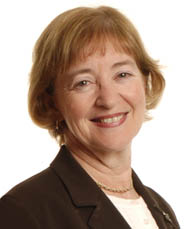A river (of passion) runs through her
A river (of passion) runs through her McGill University
User Tools (skip):
A river (of passion) runs through her

MAUDE BARLOW: Water warrrior
Maude Barlow delivers Founder’s Day speech
Maude Barlow didn’t plan on becoming one of the world’s great champions for the preservation of fresh water. It started as a trickle in the 1980s, when she squared off against Prime Minister Brian Mulroney to have water exempted from the Canada-U.S. Free Trade Agreement. “It was just my concern for our jurisdictional right and responsibility to care for that water,” she said over the phone two days before she was to speak at the Macdonald Campus Founder’s Day Celebrations.
She lost that battle, but the experience proved to be the source from which sprang a veritable torrent of passion for the state of the world’s water supply. “I don’t know why,” she said, laughing, “but from there I just took off on this journey and have never looked back.”
As the National Chairperson of the Council of Canadians, Canada’s largest public advocacy organization, Barlow was called “Canada’s best known voice of dissent” in a 2001 documentary, Immovable Maude: the Life and Times of Maude Barlow. Unblinking in her focus (with the possible exception of a tear-gassing at the 2001 Summit of the Americas), Barlow is equally indefatigable in her pursuit of justice and accountability.
The best-selling author and co-author of 16 books, Barlow has just published Blue Covenant: The Global Water Crisis and The Fight for the Right to Water (McClelland & Stewart, 2007). In it, she stands conventional wisdom – that many problems with the world’s water supply (such as drought) are caused by global warming and climate change – right on its head. “I’m working with scientists to make the case that pollution, displacement and mismanagement of water are some of the causes of climate change.”
“For instance,” she said, “in India there are 23 million bore wells pumping water 24/7. There are people there who go to sleep having full access to water who wake up the next day with none.”
Barlow is quick to point out her own Indian example plays into the complacency of Canadians who are under the false impression they are safe from such crises. “The Great Lakes are in terrible shape – they are declining because we are pumping out more than nature can put back in. Lake Winnipeg is almost dead – it’s one of the sickest lakes in North America.
“We think we have an endless supply of water,” she said. “A few years ago, I was in Newfoundland speaking against the exportation of water and all that the people there could tell me was ‘But darlin’, there’s nothing but water here.’ And I said, ‘Yeah? Well that’s what they said about the cod, right?’ Suddenly I had their attention.”
Barlow said that while people know what needs to be done to help reverse a dire situation (including more sustainable agriculture practices and infrastructure repair in urban areas where waste water often goes back into the water systems untreated), the political will often seems lacking. “As we run out of clean water, it becomes more valuable, like blue gold,” she said. “A lot of people are eager to profit from the crisis, such as bottled water companies and even some big recycling companies.”
Which is why she is so pleased to be speaking at Mac. “The Brace Centre for Water Resource Management is really one of the most important world leaders in water management,” Barlow said. “I’m quite honoured to be able to pay homage to it.”
Plus, it’s always great to speak to students because, quite frankly, they get it. These are people thinking ‘What can I do with my knowledge?’ whether it be in law, engineering, urban planning or anything else. If you put the information in front of people, there’s a tremendous desire to do the right thing.”

